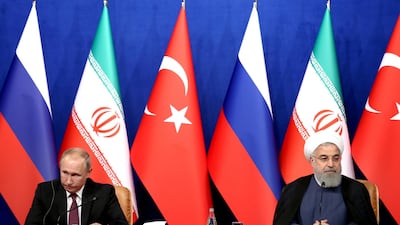There can be little doubt about who emerged as the dominant partner when the presidents of Turkey, Russia and Iran convened in Tehran to discuss the next stage in Syria’s brutal war.
Turkish President Tayyip Erdogan flew to Tehran with his Russian counterpart, Vladimir Putin, to join Iranian President Hassan Rouhani for a discussion on the fate of Idlib, the rebel-held province that is the last remaining redoubt of the anti-Assad opposition movement.
Any hopes that the three leaders would find common accord quickly disappeared when Mr Putin made it clear that, so far as Russia was concerned, a ceasefire was out of the question. So long as the Islamist terrorist groups fighting to overthrow regime of Syrian President Bashar Al Assad refused to negotiate, the Russians argued, there was no point in having a ceasefire that would hand them an advantage on the battlefield.
And, despite the strong counter arguments advanced by Mr Erdogan, who is concerned about the effect another Assad-inspired bloodbath might have on the region, it was the Russian leader's voice that prevailed, thereby confirming the pre-eminence of Mr Putin's status in this dreadful conflict.
Mr Putin no doubt believes he deserves this status given the decisive impact Russia’s military intervention has had in turning the tide of the conflict in favour of Mr Al Assad.
It was not that long ago, after all, that the Assad regime was staring defeat in the face. That was before Qassem Soleimani, the head of the Iranian Revolutionary Guard Corps’ Quds force, flew to Moscow and persuaded Mr Putin to intervene in September 2015 on the Assad regime’s behalf.
The rest, as they say, is history. Within months of Russia deploying warplanes and a range of other military assets, the conflict had turned decisively in Mr Al Assad’s favour, to the extent that anti-government forces have suffered a series of calamitous defeats, so much so that Idlib now constitutes the last remaining vestige of resistance to Damascus.
As the Assad regime, together with its Russian and Iranian backers, mounts a final assault to crush the last pockets of resistance in Idlib, the Turks remain deeply concerned about the estimated three million Syrian civilians who are said to be trapped in the province.
The UN is also fearful that the province could be the scene of yet another humanitarian disaster in Syria's seven year conflict, especially if Assad loyalists revert to their tried and tested formula of indiscriminately dropping barrel bombs against targets located in densely populated civilian areas.
This is why Mr Erdogan is so desperate for the other powers involved in the conflict to show restraint and tried to persuade Mr Putin and Mr Rouhani to implement a ceasefire that would allow the remnants of Islamist terror groups such as Al Qaeda, ISIS and the Al Nusra Front to withdraw, thereby forestalling a massacre of the province’s defenceless civilian population.
Indeed, Turkey has legitimate concerns about the Syrian conflict triggering another refugee crisis. It has already accommodated around 3.5 million refugees from Syria since the conflict started and Ankara insists it simply does not have the capacity to take any more.
But with Mr Putin, as well as his allies in Tehran and Damascus, seemingly intent on resolving the Idlib issue through force, the Turks can only hope that there is an expeditious end to the fighting and that the regime’s assault on the defenceless inhabitants of the province does not, as Mr Erdogan argued, “play into the hands of terrorists” through the use of tactics that have no regard for civilian lives.
But while Mr Putin reflects on his success in getting his way in the Tehran summit, he should also take note that Moscow's attempts to dominate the Syrian agenda might not necessarily be met with the wholehearted approval of Iran.
Despite the insistence of Moscow and Tehran that they are working to achieve the same goal, namely helping Mr Al Assad to unite the whole of Syria under his barbaric rule, there are, nonetheless, significant differences emerging between the Russian and Iranian positions.
Moscow’s approach is, in essence, governed by the principles of realpolitik, which in the case of Syria simply means the military presence it has enjoyed in the country since the Cold War.
Iran’s outlook, by contrast, is far more ideological, and its involvement in the conflict is driven by its desire to export the Iranian revolution, while at the same time consolidating its military reach throughout the Arab world.
There is also a strong sense in Tehran that, while Mr Putin seems to be claiming all the credit for saving the Assad regime from imminent defeat, it is Iran that has made the bigger sacrifice in the conflict. From the outset of Moscow’s involvement, the Kremlin has been keen to keep Russian casualties to a minimum. For this reason most of Russia’s military involvement has been confined to conducting air strikes.
Russian involvement in ground fighting has been minimal, while the Iranians, together with their Hezbollah allies in southern Lebanon, have done the lion's share of the fighting alongside Assad loyalists. This has resulted in significant casualties, particularly for Hezbollah, which has lost thousands of fighters in the conflict.
Now that the war in coming to an end, the Iranians believe they have every right to reward themselves by establishing a permanent military presence in Syria, thereby enabling to improve their offensive capabilities against Israel.
But this tactic is unlikely to go down well in the Kremlin, where Mr Putin has developed a good relationship with Israeli Prime Minister Benjamin Netanyahu. Consequently, if the Israelis complain to Moscow about Iran’s continued meddling in Syria, there is every likelihood that the Russian leader will side with the Israelis, rather than backing his erstwhile allies in Tehran.
Con Coughlin is the Daily Telegraph’s defence and foreign affairs editor


